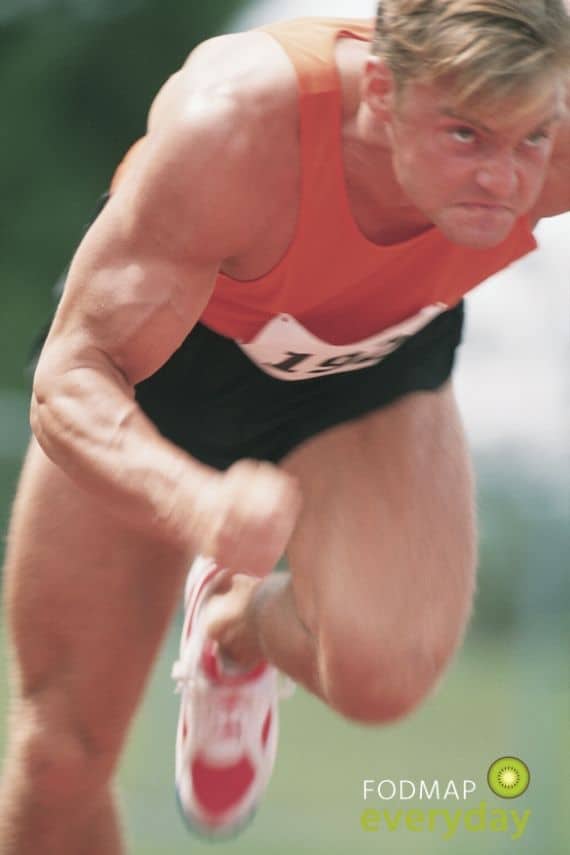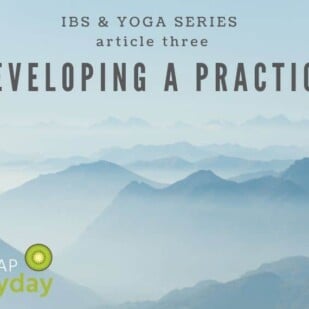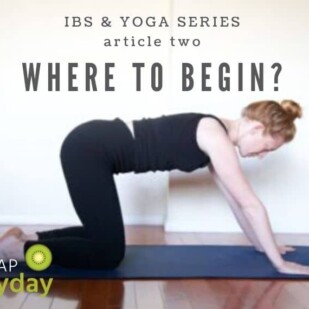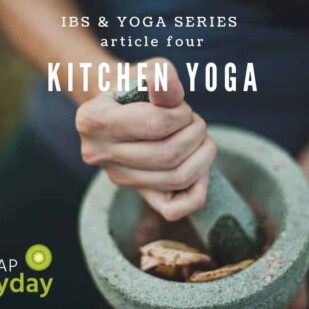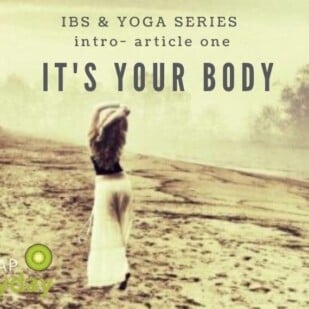This is the fifth article in the IBS & Yoga Series “It’s Your Body!” where we help you explore ways of learning to listen to your body. You can find the introduction here. And all of the articles here. And be sure to read our interview with Kiera.
Identifying The Habits That Define You
The presentation of information here is meant to help you ask, and potentially answer, questions that are helpful in discovering and strengthening your own healthcare practice.
Everything here is meant as a suggestion, not as a prescription or as the one right way. I’ve been in hundreds of somatic (body) classes, with dozens of teachers from all over the world, read many books, and spent a lot of time on my mat by myself, and through all of that information, I pull out what is right for me, and set aside what feels wrong.
It is then my work to continue practicing and bring into my life that which I find to be right – and to let the rest go. So, read on with an open mind, and listen with an open body (but that’s just a suggestion! 🙂 )
The Many Factors Leading To IBS
IBS can be complex to treat, because IBS is “a disorder with variable symptoms having possible neurological, immunological, or psycho-emotional roots,” (Gary Kraftsow, Yoga for Transformation, 2002). Meaning that the root of the problem is usually complex and layered, pertaining not only to one factor such as diet, but to a combination of many – including stress, emotional state, sleep, etc.
So, you might have to really dig in to the basic blocks that you are built of to figure out how to help yourself rebuild your own system such that it functions smoothly, and without chronic pain. Practice is really helpful here.
Learning To Observe Yourself
In developing a practice to deal with a multifaceted issue so deeply rooted in your system, a large portion of the work is bound to be observational – at least at the beginning. The body is deep, layered and complex, and the only layer you can see with your eyes is the outermost layer of skin. So, you will need other forms of observation.
Just as we talked about in my Intro article, before you will be able to listen to or “hear” your body, you have to understand your body’s language. This is an ongoing process, but I hope you’ll stick with it, because your health is important.
Trust what you observe, and then take action
Self-observation can directly lead to action steps in your health care. However, in gleaning these action steps out of self-observation, there is a place where people I work with often get stuck: when the needed action compromises identity.
Since “you” and “your body” are not separate (but sometimes may feel disconnected), there can be some things that “your body” might say that “you” are simply not interested in hearing.
Some Examples of Ingrained Habits
Here’s an anecdotal example of what I mean. I had a friend, a beautiful woman – earthy, and sensual. She had a great and very identifiable walk, hips swaying freely from side to side. People would reference it in conversation and try to lovingly emulate it. This bodily action was part of her identity.
Unfortunately, this action was also causing strain in her lower back and grinding in her hip joints. She had started to experience some pretty severe chronic lower back pain due to a herniated disk, and this was aggravating it. Her hip swinging was not the only culprit, but it was one of the hardest to address and change, because listening to that part of her body meant potentially losing or at least shifting a piece of her identity.
In another example, a man I was working with doing Shiatsu was a vigorously fast daily runner. He could outrun all of our mutual friends and it was often mentioned at dinners or amongst friends how fast he had always been and how he could “leave you in the dust.” He was known for his speed and stamina, and he was proud of it.
In our intake, he told me how he was feeling tight and very stressed. During our sessions, I found a massive amount of heat and tension stored up in his shoulders, hips and legs and it was through slow and gentle range of motion and compression that we allowed some of it to release.
I asked if running helped release the tension, and he replied that no, he often felt more riled up and tense after a run. What he really needed for his emotional health was to come into slowness, or even stillness, and allow himself and his muscles some deep rest. After each session there was a noticeable softening in his body and attitude.
Had he been really listening to all of the information available, maybe every other day he would sit and stretch or even just go on a slow jog instead of powering up and down a large hill at full speed. This habit had repercussions on his emotional state, ability to sleep, and digestion.
Our Identity: Our Body
We all do this. In the story of each of our lives, we all have habits and tendencies that we are proud of or attached to and that make us who we are – sometimes, though, these aren’t in line with what is really best for us – or at least not to the extent that we do them.
It’s easy to be critical of yourself (that might even be one of the unfortunate habits that defines your identity) but it’s hard to do a self critique! And that is what I’m asking you to attempt. If it’s for gut health, or general wellbeing, use the tools from the first article “It’s Your Body: Where to Begin” to engage with your habits, your preferences, your tendencies, your inclinations throughout a normal day, week, month.
Do any of your habits undermine your health? If a habit is tied to your identity, you are less likely to change it. Which physical habits are tied to your identity? Maybe it will cause you to ponder your identity. Perhaps that’s not a bad thing! You are more than your presumed identity and by letting your identity go you will see an opening to be anything else – and everything else.
So, this is partly about identifying habits that are in opposition to your greater well-being, or that are contributing directly to your discomfort or sickness. But perhaps more importantly it is about seeing where your identity is tied to your habits, where your habits are tied to your health, and figuring out how to relax the hold on your identity when it compromises YOU.
There is really not going to be much benefit to doing exercises or changing your diet if you aren’t going to pay attention, listen to what you encounter, and respond accordingly. If you are very attached to the way you are, then the way you are is not going to change. You, however, are not your identity, but you are made up of your habits and actions, your thoughts and intentions, the things you eat and the things you say. Investigate those, pull them apart, get beneath the skin, see how they function, be as you really are in each new moment.

